LC4S181 - Corporate Governance in the UK: A Comprehensive Analysis
VerifiedAdded on 2023/04/19
|14
|3628
|114
Essay
AI Summary
This essay provides a comprehensive overview of the evolution of corporate governance in the UK, starting from the early 1990s and the Cadbury Committee's response to regulatory failures, through the Hampel and Greenbury Reports, the Combined Code, the Walker Report, and culminating in the UK Corporate Governance Code of 2018. It discusses key scandals like the Maxwell and Polly Peck scandals, and the role of non-executive directors in improving corporate management. The essay also analyzes the effectiveness of the present corporate governance framework, highlighting the emphasis on transparency, integrity, stakeholder relationships, board diversity, and proportionate remuneration. It further details the composition of the board, the independence of the chair and directors, and the importance of annual re-appointment and diversity within the board structure. The essay concludes by noting the ongoing efforts to refine and improve corporate governance practices in the UK to ensure long-term success and ethical conduct.
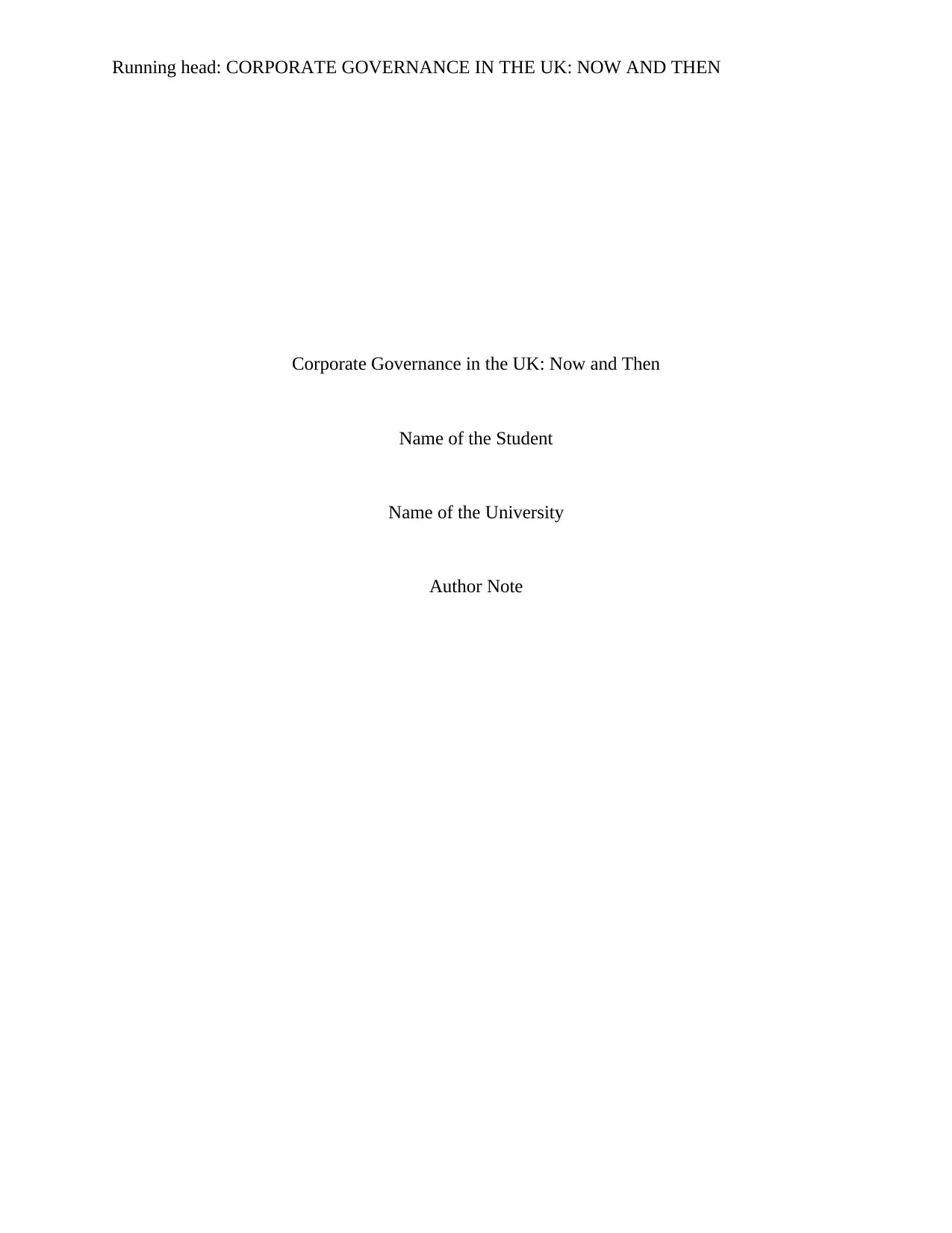
Running head: CORPORATE GOVERNANCE IN THE UK: NOW AND THEN
Corporate Governance in the UK: Now and Then
Name of the Student
Name of the University
Author Note
Corporate Governance in the UK: Now and Then
Name of the Student
Name of the University
Author Note
Paraphrase This Document
Need a fresh take? Get an instant paraphrase of this document with our AI Paraphraser
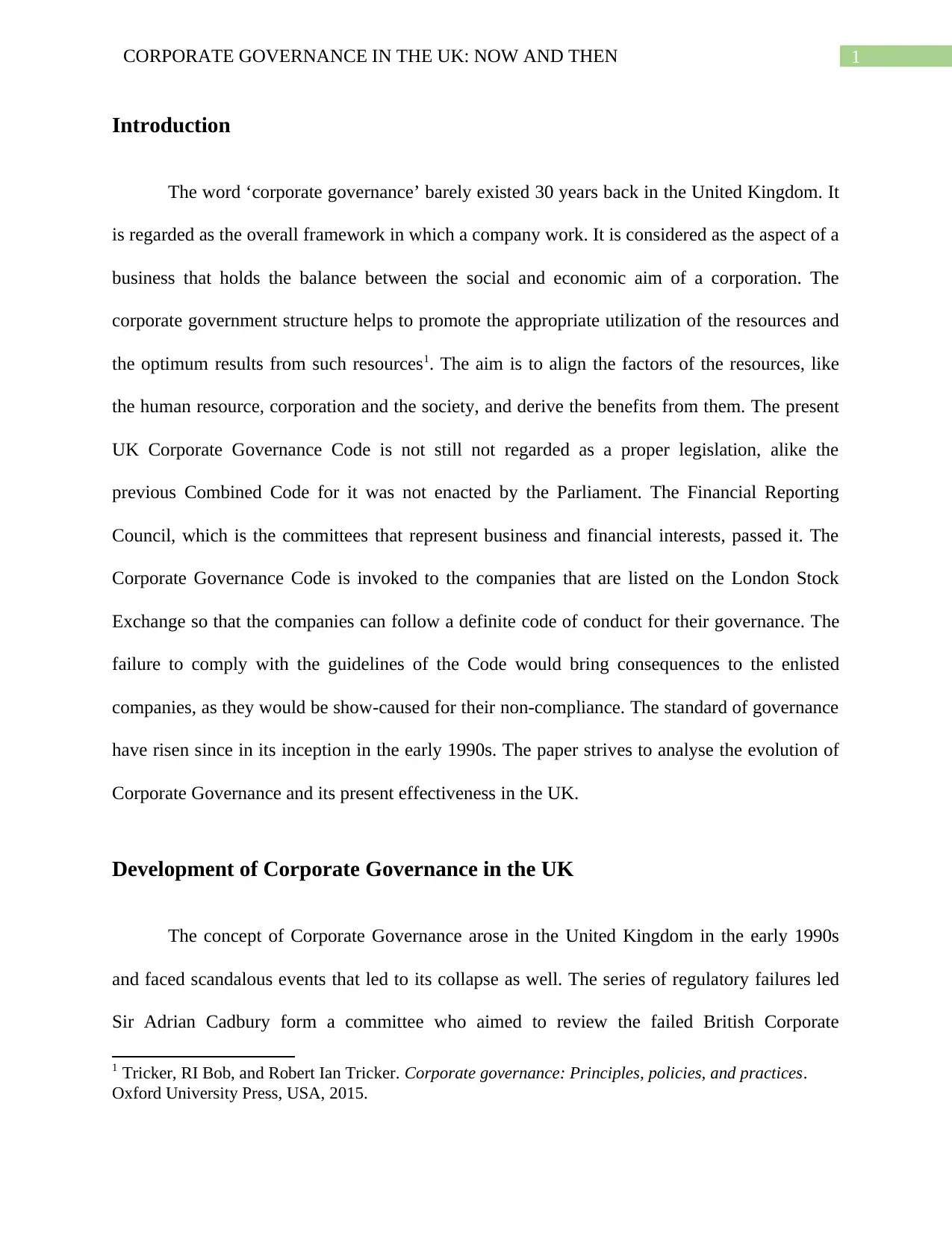
1CORPORATE GOVERNANCE IN THE UK: NOW AND THEN
Introduction
The word ‘corporate governance’ barely existed 30 years back in the United Kingdom. It
is regarded as the overall framework in which a company work. It is considered as the aspect of a
business that holds the balance between the social and economic aim of a corporation. The
corporate government structure helps to promote the appropriate utilization of the resources and
the optimum results from such resources1. The aim is to align the factors of the resources, like
the human resource, corporation and the society, and derive the benefits from them. The present
UK Corporate Governance Code is not still not regarded as a proper legislation, alike the
previous Combined Code for it was not enacted by the Parliament. The Financial Reporting
Council, which is the committees that represent business and financial interests, passed it. The
Corporate Governance Code is invoked to the companies that are listed on the London Stock
Exchange so that the companies can follow a definite code of conduct for their governance. The
failure to comply with the guidelines of the Code would bring consequences to the enlisted
companies, as they would be show-caused for their non-compliance. The standard of governance
have risen since in its inception in the early 1990s. The paper strives to analyse the evolution of
Corporate Governance and its present effectiveness in the UK.
Development of Corporate Governance in the UK
The concept of Corporate Governance arose in the United Kingdom in the early 1990s
and faced scandalous events that led to its collapse as well. The series of regulatory failures led
Sir Adrian Cadbury form a committee who aimed to review the failed British Corporate
1 Tricker, RI Bob, and Robert Ian Tricker. Corporate governance: Principles, policies, and practices.
Oxford University Press, USA, 2015.
Introduction
The word ‘corporate governance’ barely existed 30 years back in the United Kingdom. It
is regarded as the overall framework in which a company work. It is considered as the aspect of a
business that holds the balance between the social and economic aim of a corporation. The
corporate government structure helps to promote the appropriate utilization of the resources and
the optimum results from such resources1. The aim is to align the factors of the resources, like
the human resource, corporation and the society, and derive the benefits from them. The present
UK Corporate Governance Code is not still not regarded as a proper legislation, alike the
previous Combined Code for it was not enacted by the Parliament. The Financial Reporting
Council, which is the committees that represent business and financial interests, passed it. The
Corporate Governance Code is invoked to the companies that are listed on the London Stock
Exchange so that the companies can follow a definite code of conduct for their governance. The
failure to comply with the guidelines of the Code would bring consequences to the enlisted
companies, as they would be show-caused for their non-compliance. The standard of governance
have risen since in its inception in the early 1990s. The paper strives to analyse the evolution of
Corporate Governance and its present effectiveness in the UK.
Development of Corporate Governance in the UK
The concept of Corporate Governance arose in the United Kingdom in the early 1990s
and faced scandalous events that led to its collapse as well. The series of regulatory failures led
Sir Adrian Cadbury form a committee who aimed to review the failed British Corporate
1 Tricker, RI Bob, and Robert Ian Tricker. Corporate governance: Principles, policies, and practices.
Oxford University Press, USA, 2015.
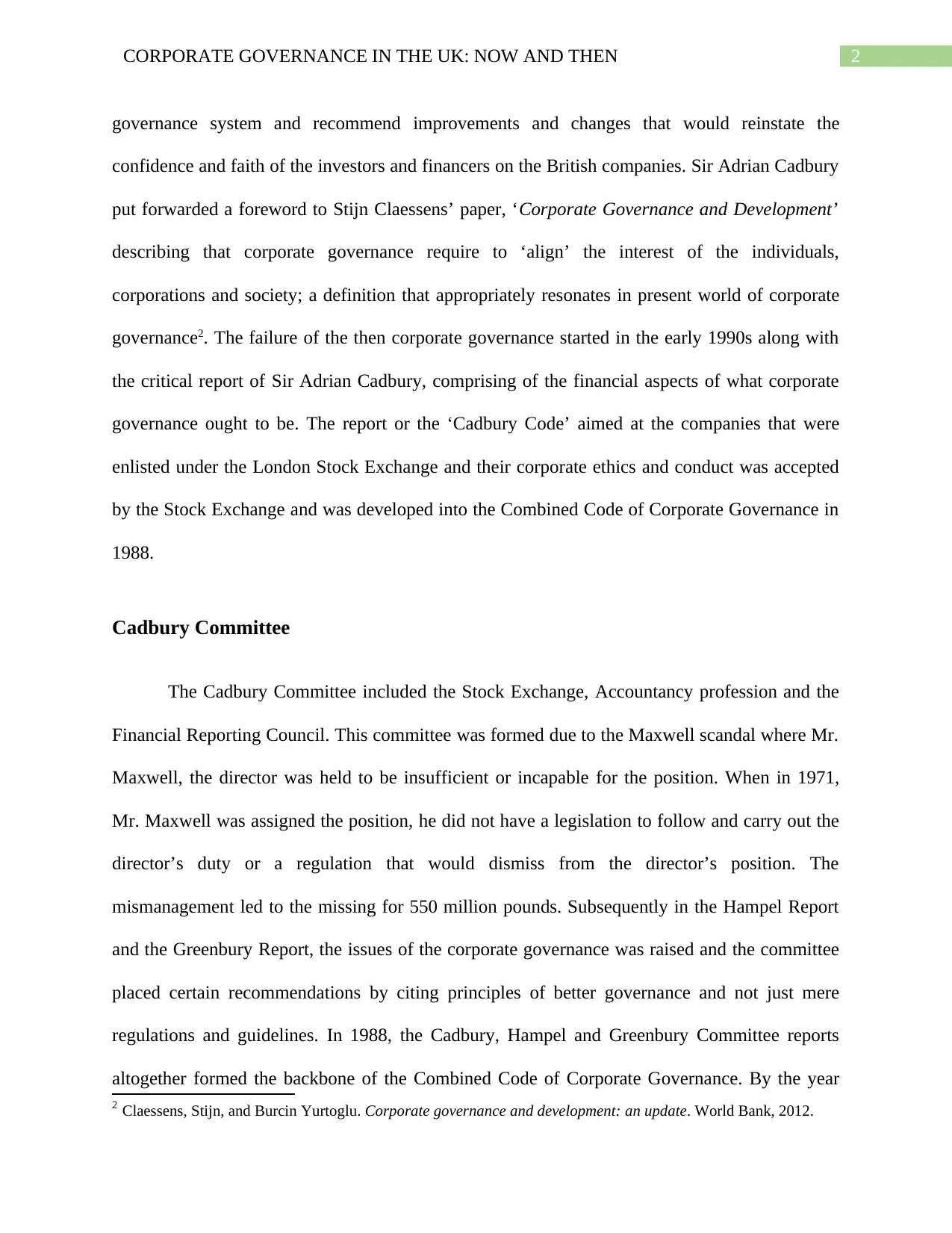
2CORPORATE GOVERNANCE IN THE UK: NOW AND THEN
governance system and recommend improvements and changes that would reinstate the
confidence and faith of the investors and financers on the British companies. Sir Adrian Cadbury
put forwarded a foreword to Stijn Claessens’ paper, ‘Corporate Governance and Development’
describing that corporate governance require to ‘align’ the interest of the individuals,
corporations and society; a definition that appropriately resonates in present world of corporate
governance2. The failure of the then corporate governance started in the early 1990s along with
the critical report of Sir Adrian Cadbury, comprising of the financial aspects of what corporate
governance ought to be. The report or the ‘Cadbury Code’ aimed at the companies that were
enlisted under the London Stock Exchange and their corporate ethics and conduct was accepted
by the Stock Exchange and was developed into the Combined Code of Corporate Governance in
1988.
Cadbury Committee
The Cadbury Committee included the Stock Exchange, Accountancy profession and the
Financial Reporting Council. This committee was formed due to the Maxwell scandal where Mr.
Maxwell, the director was held to be insufficient or incapable for the position. When in 1971,
Mr. Maxwell was assigned the position, he did not have a legislation to follow and carry out the
director’s duty or a regulation that would dismiss from the director’s position. The
mismanagement led to the missing for 550 million pounds. Subsequently in the Hampel Report
and the Greenbury Report, the issues of the corporate governance was raised and the committee
placed certain recommendations by citing principles of better governance and not just mere
regulations and guidelines. In 1988, the Cadbury, Hampel and Greenbury Committee reports
altogether formed the backbone of the Combined Code of Corporate Governance. By the year
2 Claessens, Stijn, and Burcin Yurtoglu. Corporate governance and development: an update. World Bank, 2012.
governance system and recommend improvements and changes that would reinstate the
confidence and faith of the investors and financers on the British companies. Sir Adrian Cadbury
put forwarded a foreword to Stijn Claessens’ paper, ‘Corporate Governance and Development’
describing that corporate governance require to ‘align’ the interest of the individuals,
corporations and society; a definition that appropriately resonates in present world of corporate
governance2. The failure of the then corporate governance started in the early 1990s along with
the critical report of Sir Adrian Cadbury, comprising of the financial aspects of what corporate
governance ought to be. The report or the ‘Cadbury Code’ aimed at the companies that were
enlisted under the London Stock Exchange and their corporate ethics and conduct was accepted
by the Stock Exchange and was developed into the Combined Code of Corporate Governance in
1988.
Cadbury Committee
The Cadbury Committee included the Stock Exchange, Accountancy profession and the
Financial Reporting Council. This committee was formed due to the Maxwell scandal where Mr.
Maxwell, the director was held to be insufficient or incapable for the position. When in 1971,
Mr. Maxwell was assigned the position, he did not have a legislation to follow and carry out the
director’s duty or a regulation that would dismiss from the director’s position. The
mismanagement led to the missing for 550 million pounds. Subsequently in the Hampel Report
and the Greenbury Report, the issues of the corporate governance was raised and the committee
placed certain recommendations by citing principles of better governance and not just mere
regulations and guidelines. In 1988, the Cadbury, Hampel and Greenbury Committee reports
altogether formed the backbone of the Combined Code of Corporate Governance. By the year
2 Claessens, Stijn, and Burcin Yurtoglu. Corporate governance and development: an update. World Bank, 2012.
⊘ This is a preview!⊘
Do you want full access?
Subscribe today to unlock all pages.

Trusted by 1+ million students worldwide
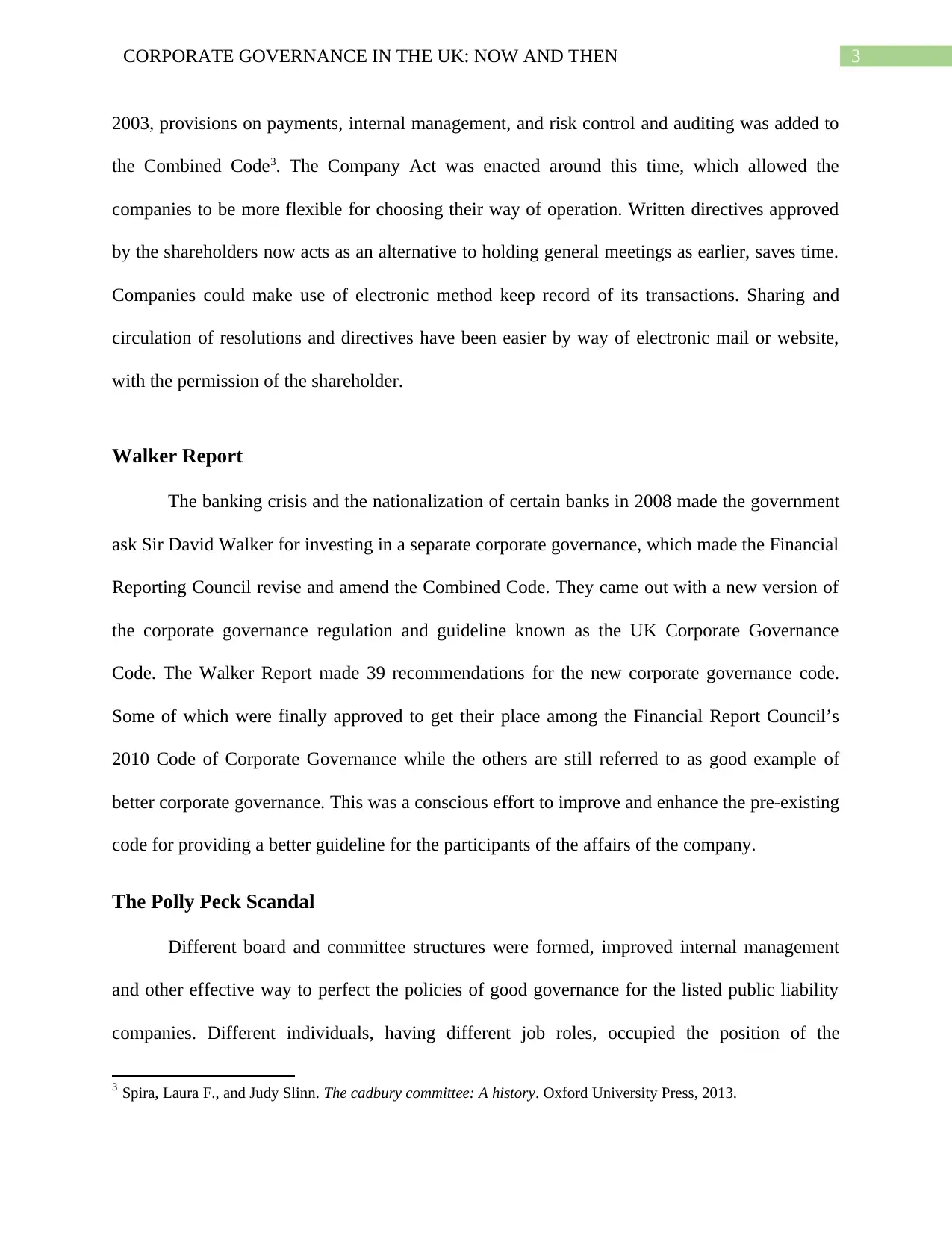
3CORPORATE GOVERNANCE IN THE UK: NOW AND THEN
2003, provisions on payments, internal management, and risk control and auditing was added to
the Combined Code3. The Company Act was enacted around this time, which allowed the
companies to be more flexible for choosing their way of operation. Written directives approved
by the shareholders now acts as an alternative to holding general meetings as earlier, saves time.
Companies could make use of electronic method keep record of its transactions. Sharing and
circulation of resolutions and directives have been easier by way of electronic mail or website,
with the permission of the shareholder.
Walker Report
The banking crisis and the nationalization of certain banks in 2008 made the government
ask Sir David Walker for investing in a separate corporate governance, which made the Financial
Reporting Council revise and amend the Combined Code. They came out with a new version of
the corporate governance regulation and guideline known as the UK Corporate Governance
Code. The Walker Report made 39 recommendations for the new corporate governance code.
Some of which were finally approved to get their place among the Financial Report Council’s
2010 Code of Corporate Governance while the others are still referred to as good example of
better corporate governance. This was a conscious effort to improve and enhance the pre-existing
code for providing a better guideline for the participants of the affairs of the company.
The Polly Peck Scandal
Different board and committee structures were formed, improved internal management
and other effective way to perfect the policies of good governance for the listed public liability
companies. Different individuals, having different job roles, occupied the position of the
3 Spira, Laura F., and Judy Slinn. The cadbury committee: A history. Oxford University Press, 2013.
2003, provisions on payments, internal management, and risk control and auditing was added to
the Combined Code3. The Company Act was enacted around this time, which allowed the
companies to be more flexible for choosing their way of operation. Written directives approved
by the shareholders now acts as an alternative to holding general meetings as earlier, saves time.
Companies could make use of electronic method keep record of its transactions. Sharing and
circulation of resolutions and directives have been easier by way of electronic mail or website,
with the permission of the shareholder.
Walker Report
The banking crisis and the nationalization of certain banks in 2008 made the government
ask Sir David Walker for investing in a separate corporate governance, which made the Financial
Reporting Council revise and amend the Combined Code. They came out with a new version of
the corporate governance regulation and guideline known as the UK Corporate Governance
Code. The Walker Report made 39 recommendations for the new corporate governance code.
Some of which were finally approved to get their place among the Financial Report Council’s
2010 Code of Corporate Governance while the others are still referred to as good example of
better corporate governance. This was a conscious effort to improve and enhance the pre-existing
code for providing a better guideline for the participants of the affairs of the company.
The Polly Peck Scandal
Different board and committee structures were formed, improved internal management
and other effective way to perfect the policies of good governance for the listed public liability
companies. Different individuals, having different job roles, occupied the position of the
3 Spira, Laura F., and Judy Slinn. The cadbury committee: A history. Oxford University Press, 2013.
Paraphrase This Document
Need a fresh take? Get an instant paraphrase of this document with our AI Paraphraser
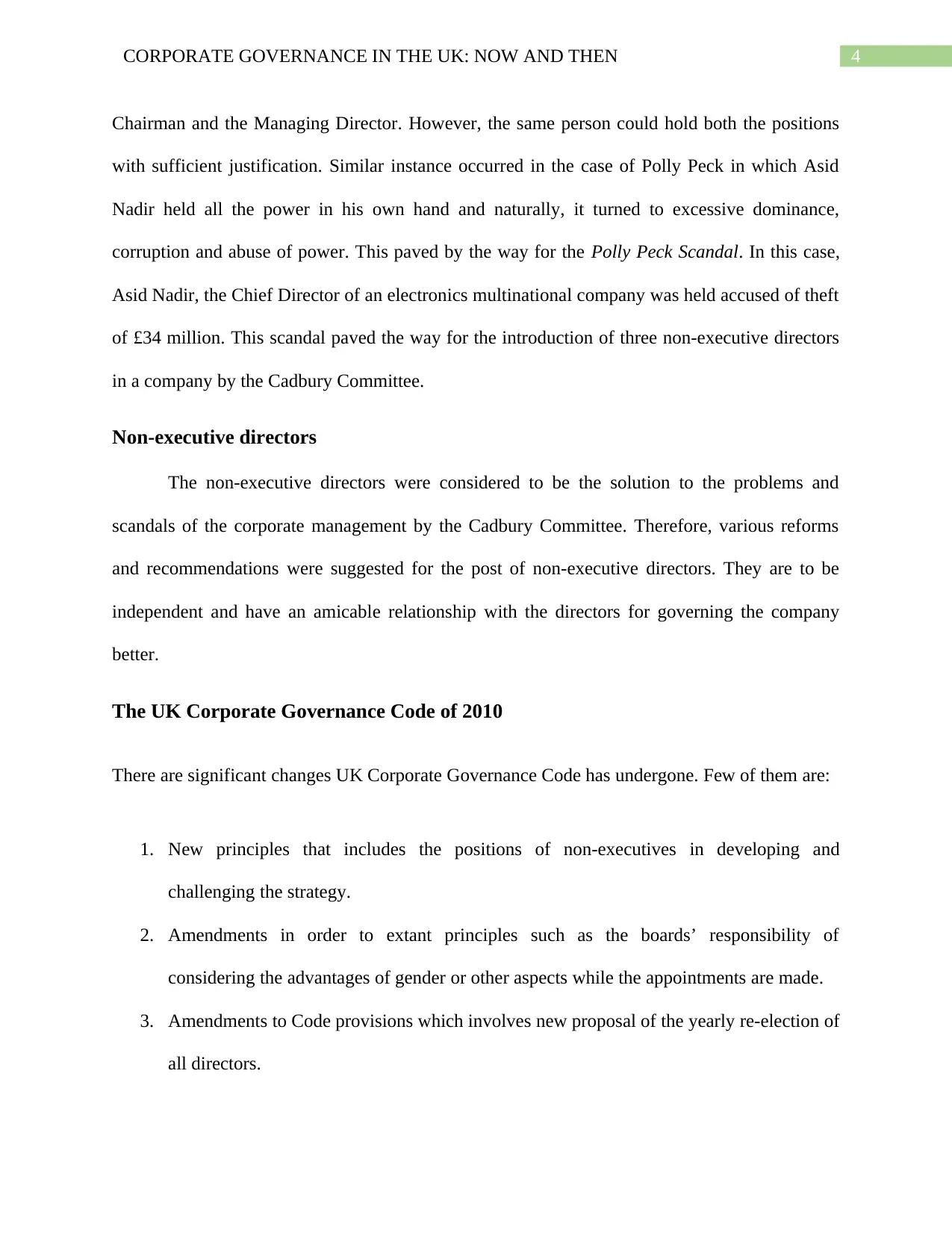
4CORPORATE GOVERNANCE IN THE UK: NOW AND THEN
Chairman and the Managing Director. However, the same person could hold both the positions
with sufficient justification. Similar instance occurred in the case of Polly Peck in which Asid
Nadir held all the power in his own hand and naturally, it turned to excessive dominance,
corruption and abuse of power. This paved by the way for the Polly Peck Scandal. In this case,
Asid Nadir, the Chief Director of an electronics multinational company was held accused of theft
of £34 million. This scandal paved the way for the introduction of three non-executive directors
in a company by the Cadbury Committee.
Non-executive directors
The non-executive directors were considered to be the solution to the problems and
scandals of the corporate management by the Cadbury Committee. Therefore, various reforms
and recommendations were suggested for the post of non-executive directors. They are to be
independent and have an amicable relationship with the directors for governing the company
better.
The UK Corporate Governance Code of 2010
There are significant changes UK Corporate Governance Code has undergone. Few of them are:
1. New principles that includes the positions of non-executives in developing and
challenging the strategy.
2. Amendments in order to extant principles such as the boards’ responsibility of
considering the advantages of gender or other aspects while the appointments are made.
3. Amendments to Code provisions which involves new proposal of the yearly re-election of
all directors.
Chairman and the Managing Director. However, the same person could hold both the positions
with sufficient justification. Similar instance occurred in the case of Polly Peck in which Asid
Nadir held all the power in his own hand and naturally, it turned to excessive dominance,
corruption and abuse of power. This paved by the way for the Polly Peck Scandal. In this case,
Asid Nadir, the Chief Director of an electronics multinational company was held accused of theft
of £34 million. This scandal paved the way for the introduction of three non-executive directors
in a company by the Cadbury Committee.
Non-executive directors
The non-executive directors were considered to be the solution to the problems and
scandals of the corporate management by the Cadbury Committee. Therefore, various reforms
and recommendations were suggested for the post of non-executive directors. They are to be
independent and have an amicable relationship with the directors for governing the company
better.
The UK Corporate Governance Code of 2010
There are significant changes UK Corporate Governance Code has undergone. Few of them are:
1. New principles that includes the positions of non-executives in developing and
challenging the strategy.
2. Amendments in order to extant principles such as the boards’ responsibility of
considering the advantages of gender or other aspects while the appointments are made.
3. Amendments to Code provisions which involves new proposal of the yearly re-election of
all directors.
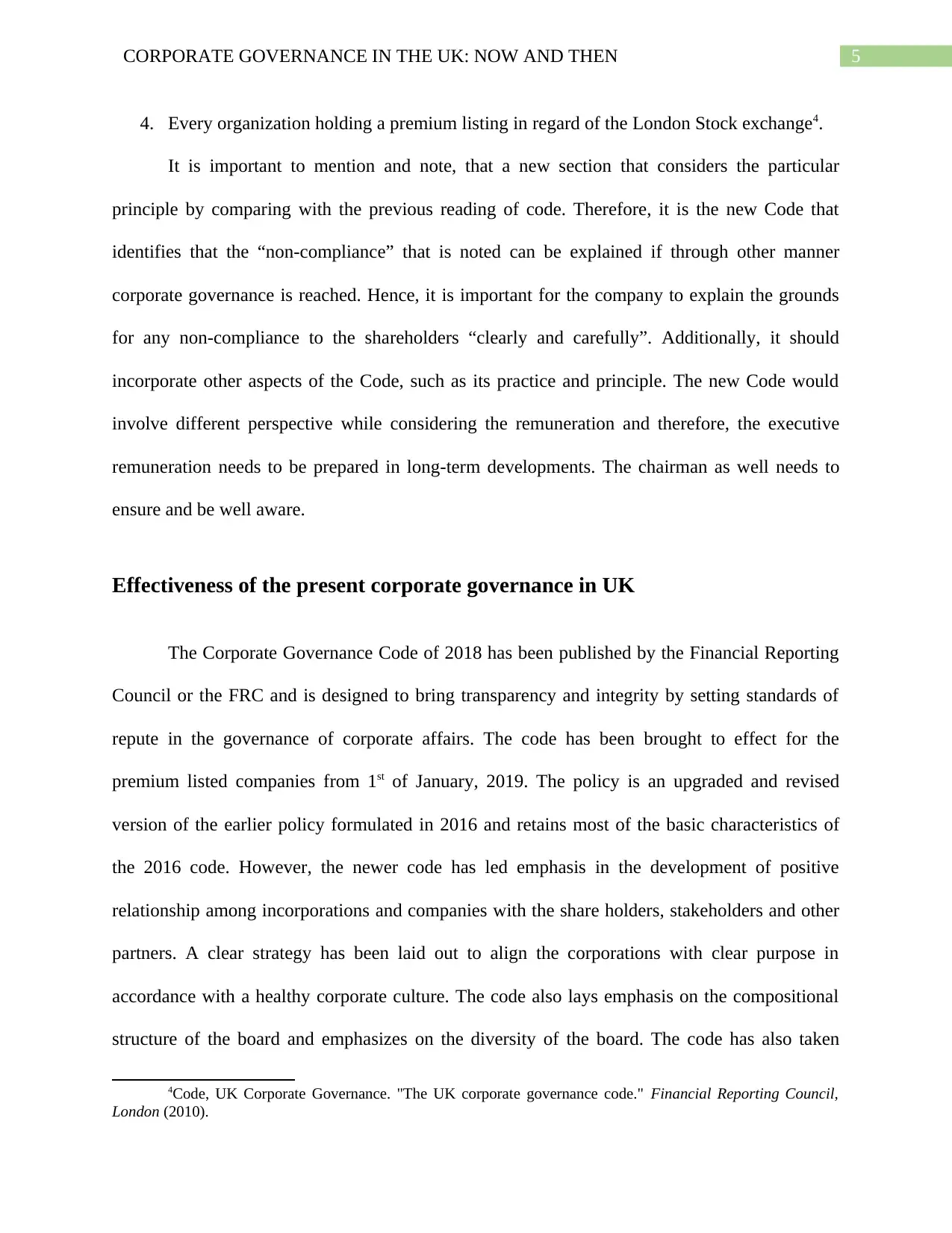
5CORPORATE GOVERNANCE IN THE UK: NOW AND THEN
4. Every organization holding a premium listing in regard of the London Stock exchange4.
It is important to mention and note, that a new section that considers the particular
principle by comparing with the previous reading of code. Therefore, it is the new Code that
identifies that the “non-compliance” that is noted can be explained if through other manner
corporate governance is reached. Hence, it is important for the company to explain the grounds
for any non-compliance to the shareholders “clearly and carefully”. Additionally, it should
incorporate other aspects of the Code, such as its practice and principle. The new Code would
involve different perspective while considering the remuneration and therefore, the executive
remuneration needs to be prepared in long-term developments. The chairman as well needs to
ensure and be well aware.
Effectiveness of the present corporate governance in UK
The Corporate Governance Code of 2018 has been published by the Financial Reporting
Council or the FRC and is designed to bring transparency and integrity by setting standards of
repute in the governance of corporate affairs. The code has been brought to effect for the
premium listed companies from 1st of January, 2019. The policy is an upgraded and revised
version of the earlier policy formulated in 2016 and retains most of the basic characteristics of
the 2016 code. However, the newer code has led emphasis in the development of positive
relationship among incorporations and companies with the share holders, stakeholders and other
partners. A clear strategy has been laid out to align the corporations with clear purpose in
accordance with a healthy corporate culture. The code also lays emphasis on the compositional
structure of the board and emphasizes on the diversity of the board. The code has also taken
4Code, UK Corporate Governance. "The UK corporate governance code." Financial Reporting Council,
London (2010).
4. Every organization holding a premium listing in regard of the London Stock exchange4.
It is important to mention and note, that a new section that considers the particular
principle by comparing with the previous reading of code. Therefore, it is the new Code that
identifies that the “non-compliance” that is noted can be explained if through other manner
corporate governance is reached. Hence, it is important for the company to explain the grounds
for any non-compliance to the shareholders “clearly and carefully”. Additionally, it should
incorporate other aspects of the Code, such as its practice and principle. The new Code would
involve different perspective while considering the remuneration and therefore, the executive
remuneration needs to be prepared in long-term developments. The chairman as well needs to
ensure and be well aware.
Effectiveness of the present corporate governance in UK
The Corporate Governance Code of 2018 has been published by the Financial Reporting
Council or the FRC and is designed to bring transparency and integrity by setting standards of
repute in the governance of corporate affairs. The code has been brought to effect for the
premium listed companies from 1st of January, 2019. The policy is an upgraded and revised
version of the earlier policy formulated in 2016 and retains most of the basic characteristics of
the 2016 code. However, the newer code has led emphasis in the development of positive
relationship among incorporations and companies with the share holders, stakeholders and other
partners. A clear strategy has been laid out to align the corporations with clear purpose in
accordance with a healthy corporate culture. The code also lays emphasis on the compositional
structure of the board and emphasizes on the diversity of the board. The code has also taken
4Code, UK Corporate Governance. "The UK corporate governance code." Financial Reporting Council,
London (2010).
⊘ This is a preview!⊘
Do you want full access?
Subscribe today to unlock all pages.

Trusted by 1+ million students worldwide
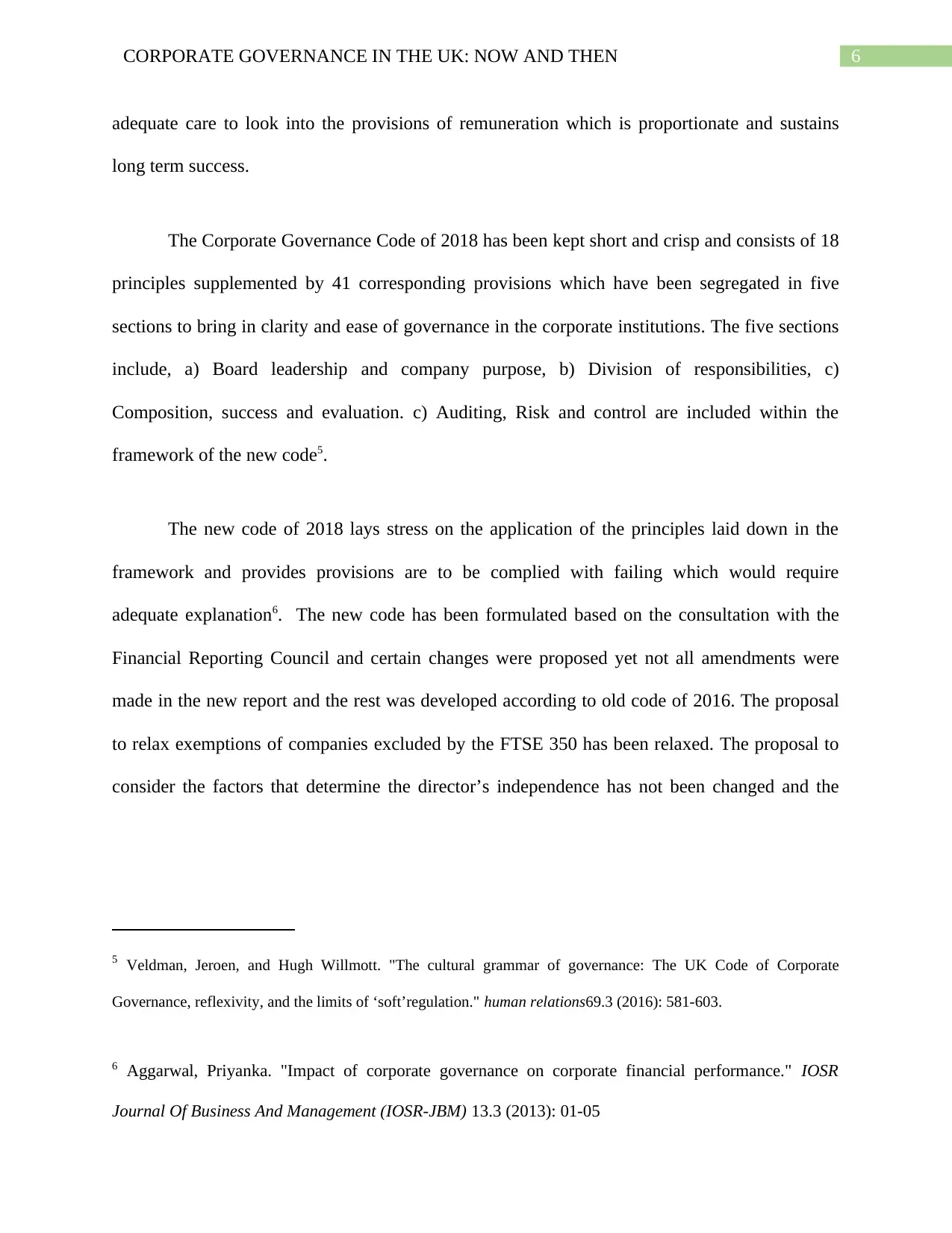
6CORPORATE GOVERNANCE IN THE UK: NOW AND THEN
adequate care to look into the provisions of remuneration which is proportionate and sustains
long term success.
The Corporate Governance Code of 2018 has been kept short and crisp and consists of 18
principles supplemented by 41 corresponding provisions which have been segregated in five
sections to bring in clarity and ease of governance in the corporate institutions. The five sections
include, a) Board leadership and company purpose, b) Division of responsibilities, c)
Composition, success and evaluation. c) Auditing, Risk and control are included within the
framework of the new code5.
The new code of 2018 lays stress on the application of the principles laid down in the
framework and provides provisions are to be complied with failing which would require
adequate explanation6. The new code has been formulated based on the consultation with the
Financial Reporting Council and certain changes were proposed yet not all amendments were
made in the new report and the rest was developed according to old code of 2016. The proposal
to relax exemptions of companies excluded by the FTSE 350 has been relaxed. The proposal to
consider the factors that determine the director’s independence has not been changed and the
5 Veldman, Jeroen, and Hugh Willmott. "The cultural grammar of governance: The UK Code of Corporate
Governance, reflexivity, and the limits of ‘soft’regulation." human relations69.3 (2016): 581-603.
6 Aggarwal, Priyanka. "Impact of corporate governance on corporate financial performance." IOSR
Journal Of Business And Management (IOSR-JBM) 13.3 (2013): 01-05
adequate care to look into the provisions of remuneration which is proportionate and sustains
long term success.
The Corporate Governance Code of 2018 has been kept short and crisp and consists of 18
principles supplemented by 41 corresponding provisions which have been segregated in five
sections to bring in clarity and ease of governance in the corporate institutions. The five sections
include, a) Board leadership and company purpose, b) Division of responsibilities, c)
Composition, success and evaluation. c) Auditing, Risk and control are included within the
framework of the new code5.
The new code of 2018 lays stress on the application of the principles laid down in the
framework and provides provisions are to be complied with failing which would require
adequate explanation6. The new code has been formulated based on the consultation with the
Financial Reporting Council and certain changes were proposed yet not all amendments were
made in the new report and the rest was developed according to old code of 2016. The proposal
to relax exemptions of companies excluded by the FTSE 350 has been relaxed. The proposal to
consider the factors that determine the director’s independence has not been changed and the
5 Veldman, Jeroen, and Hugh Willmott. "The cultural grammar of governance: The UK Code of Corporate
Governance, reflexivity, and the limits of ‘soft’regulation." human relations69.3 (2016): 581-603.
6 Aggarwal, Priyanka. "Impact of corporate governance on corporate financial performance." IOSR
Journal Of Business And Management (IOSR-JBM) 13.3 (2013): 01-05
Paraphrase This Document
Need a fresh take? Get an instant paraphrase of this document with our AI Paraphraser
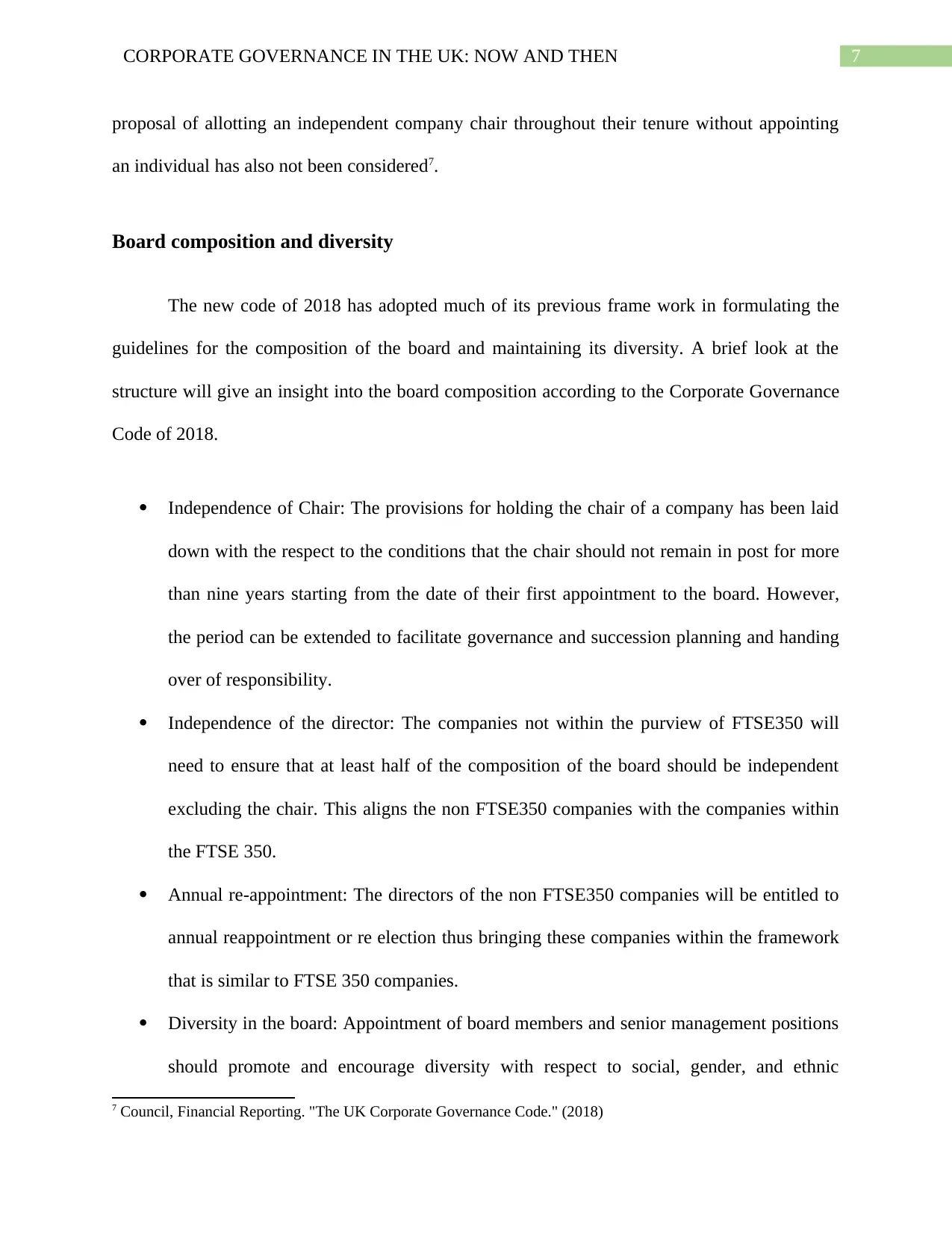
7CORPORATE GOVERNANCE IN THE UK: NOW AND THEN
proposal of allotting an independent company chair throughout their tenure without appointing
an individual has also not been considered7.
Board composition and diversity
The new code of 2018 has adopted much of its previous frame work in formulating the
guidelines for the composition of the board and maintaining its diversity. A brief look at the
structure will give an insight into the board composition according to the Corporate Governance
Code of 2018.
Independence of Chair: The provisions for holding the chair of a company has been laid
down with the respect to the conditions that the chair should not remain in post for more
than nine years starting from the date of their first appointment to the board. However,
the period can be extended to facilitate governance and succession planning and handing
over of responsibility.
Independence of the director: The companies not within the purview of FTSE350 will
need to ensure that at least half of the composition of the board should be independent
excluding the chair. This aligns the non FTSE350 companies with the companies within
the FTSE 350.
Annual re-appointment: The directors of the non FTSE350 companies will be entitled to
annual reappointment or re election thus bringing these companies within the framework
that is similar to FTSE 350 companies.
Diversity in the board: Appointment of board members and senior management positions
should promote and encourage diversity with respect to social, gender, and ethnic
7 Council, Financial Reporting. "The UK Corporate Governance Code." (2018)
proposal of allotting an independent company chair throughout their tenure without appointing
an individual has also not been considered7.
Board composition and diversity
The new code of 2018 has adopted much of its previous frame work in formulating the
guidelines for the composition of the board and maintaining its diversity. A brief look at the
structure will give an insight into the board composition according to the Corporate Governance
Code of 2018.
Independence of Chair: The provisions for holding the chair of a company has been laid
down with the respect to the conditions that the chair should not remain in post for more
than nine years starting from the date of their first appointment to the board. However,
the period can be extended to facilitate governance and succession planning and handing
over of responsibility.
Independence of the director: The companies not within the purview of FTSE350 will
need to ensure that at least half of the composition of the board should be independent
excluding the chair. This aligns the non FTSE350 companies with the companies within
the FTSE 350.
Annual re-appointment: The directors of the non FTSE350 companies will be entitled to
annual reappointment or re election thus bringing these companies within the framework
that is similar to FTSE 350 companies.
Diversity in the board: Appointment of board members and senior management positions
should promote and encourage diversity with respect to social, gender, and ethnic
7 Council, Financial Reporting. "The UK Corporate Governance Code." (2018)
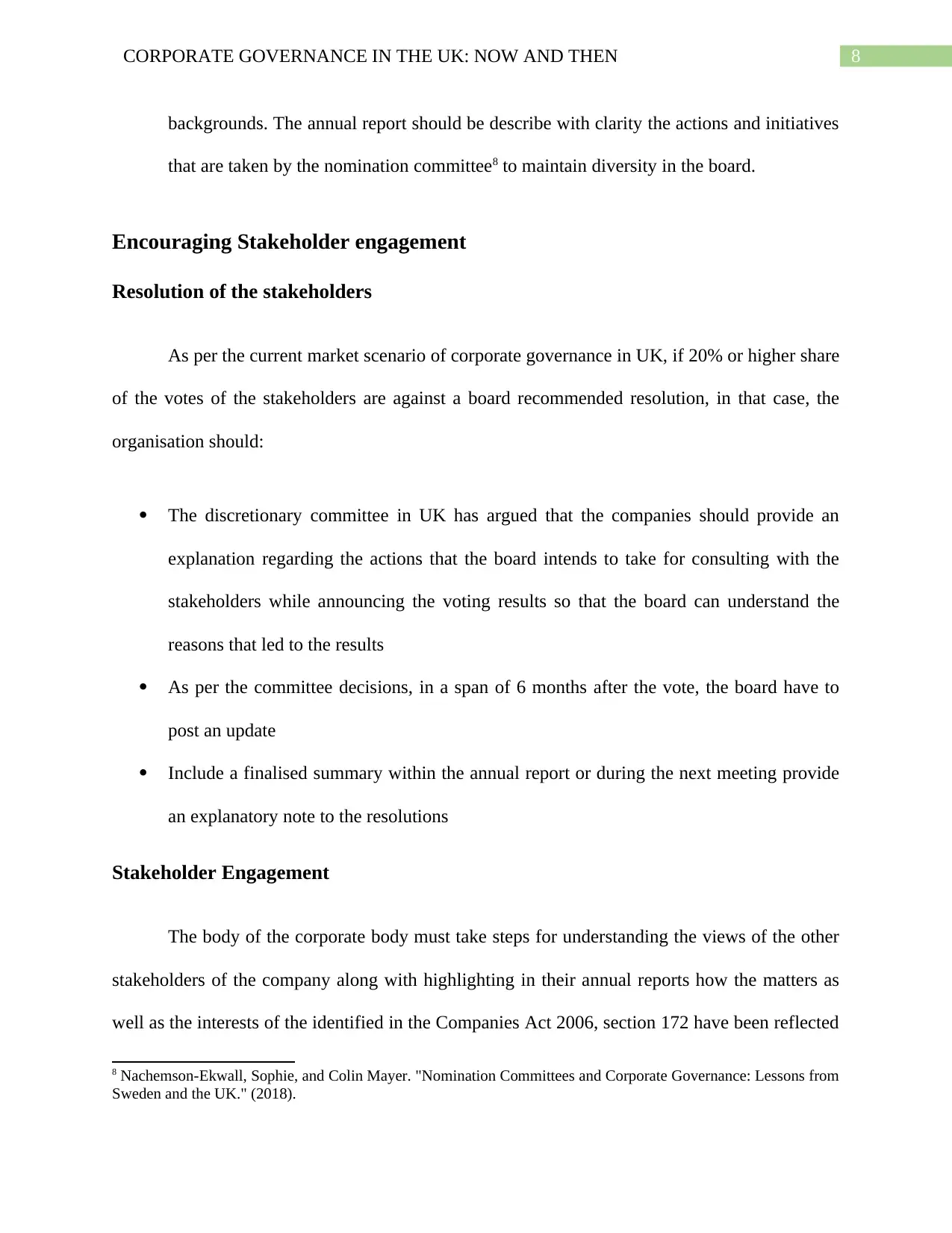
8CORPORATE GOVERNANCE IN THE UK: NOW AND THEN
backgrounds. The annual report should be describe with clarity the actions and initiatives
that are taken by the nomination committee8 to maintain diversity in the board.
Encouraging Stakeholder engagement
Resolution of the stakeholders
As per the current market scenario of corporate governance in UK, if 20% or higher share
of the votes of the stakeholders are against a board recommended resolution, in that case, the
organisation should:
The discretionary committee in UK has argued that the companies should provide an
explanation regarding the actions that the board intends to take for consulting with the
stakeholders while announcing the voting results so that the board can understand the
reasons that led to the results
As per the committee decisions, in a span of 6 months after the vote, the board have to
post an update
Include a finalised summary within the annual report or during the next meeting provide
an explanatory note to the resolutions
Stakeholder Engagement
The body of the corporate body must take steps for understanding the views of the other
stakeholders of the company along with highlighting in their annual reports how the matters as
well as the interests of the identified in the Companies Act 2006, section 172 have been reflected
8 Nachemson-Ekwall, Sophie, and Colin Mayer. "Nomination Committees and Corporate Governance: Lessons from
Sweden and the UK." (2018).
backgrounds. The annual report should be describe with clarity the actions and initiatives
that are taken by the nomination committee8 to maintain diversity in the board.
Encouraging Stakeholder engagement
Resolution of the stakeholders
As per the current market scenario of corporate governance in UK, if 20% or higher share
of the votes of the stakeholders are against a board recommended resolution, in that case, the
organisation should:
The discretionary committee in UK has argued that the companies should provide an
explanation regarding the actions that the board intends to take for consulting with the
stakeholders while announcing the voting results so that the board can understand the
reasons that led to the results
As per the committee decisions, in a span of 6 months after the vote, the board have to
post an update
Include a finalised summary within the annual report or during the next meeting provide
an explanatory note to the resolutions
Stakeholder Engagement
The body of the corporate body must take steps for understanding the views of the other
stakeholders of the company along with highlighting in their annual reports how the matters as
well as the interests of the identified in the Companies Act 2006, section 172 have been reflected
8 Nachemson-Ekwall, Sophie, and Colin Mayer. "Nomination Committees and Corporate Governance: Lessons from
Sweden and the UK." (2018).
⊘ This is a preview!⊘
Do you want full access?
Subscribe today to unlock all pages.

Trusted by 1+ million students worldwide
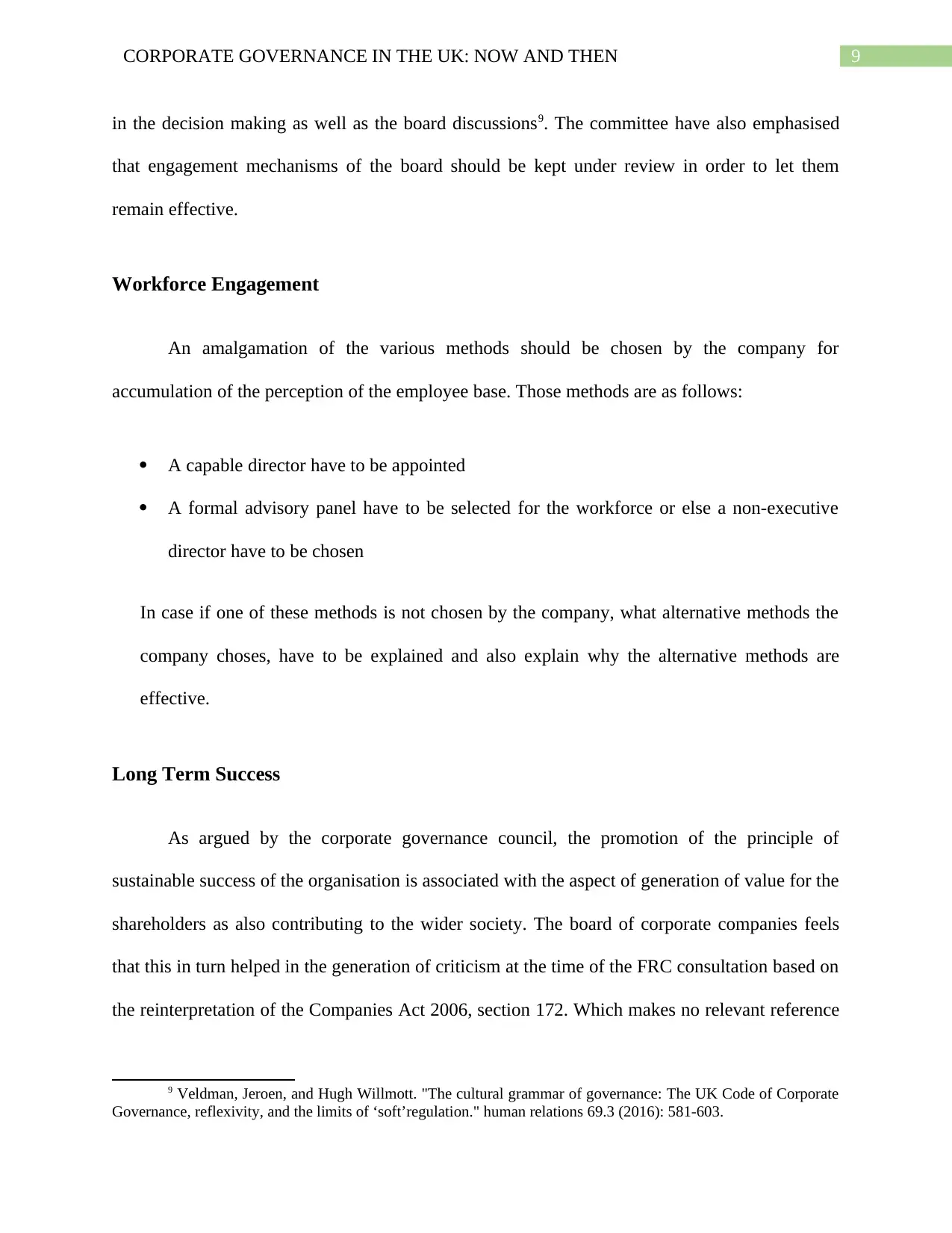
9CORPORATE GOVERNANCE IN THE UK: NOW AND THEN
in the decision making as well as the board discussions9. The committee have also emphasised
that engagement mechanisms of the board should be kept under review in order to let them
remain effective.
Workforce Engagement
An amalgamation of the various methods should be chosen by the company for
accumulation of the perception of the employee base. Those methods are as follows:
A capable director have to be appointed
A formal advisory panel have to be selected for the workforce or else a non-executive
director have to be chosen
In case if one of these methods is not chosen by the company, what alternative methods the
company choses, have to be explained and also explain why the alternative methods are
effective.
Long Term Success
As argued by the corporate governance council, the promotion of the principle of
sustainable success of the organisation is associated with the aspect of generation of value for the
shareholders as also contributing to the wider society. The board of corporate companies feels
that this in turn helped in the generation of criticism at the time of the FRC consultation based on
the reinterpretation of the Companies Act 2006, section 172. Which makes no relevant reference
9 Veldman, Jeroen, and Hugh Willmott. "The cultural grammar of governance: The UK Code of Corporate
Governance, reflexivity, and the limits of ‘soft’regulation." human relations 69.3 (2016): 581-603.
in the decision making as well as the board discussions9. The committee have also emphasised
that engagement mechanisms of the board should be kept under review in order to let them
remain effective.
Workforce Engagement
An amalgamation of the various methods should be chosen by the company for
accumulation of the perception of the employee base. Those methods are as follows:
A capable director have to be appointed
A formal advisory panel have to be selected for the workforce or else a non-executive
director have to be chosen
In case if one of these methods is not chosen by the company, what alternative methods the
company choses, have to be explained and also explain why the alternative methods are
effective.
Long Term Success
As argued by the corporate governance council, the promotion of the principle of
sustainable success of the organisation is associated with the aspect of generation of value for the
shareholders as also contributing to the wider society. The board of corporate companies feels
that this in turn helped in the generation of criticism at the time of the FRC consultation based on
the reinterpretation of the Companies Act 2006, section 172. Which makes no relevant reference
9 Veldman, Jeroen, and Hugh Willmott. "The cultural grammar of governance: The UK Code of Corporate
Governance, reflexivity, and the limits of ‘soft’regulation." human relations 69.3 (2016): 581-603.
Paraphrase This Document
Need a fresh take? Get an instant paraphrase of this document with our AI Paraphraser
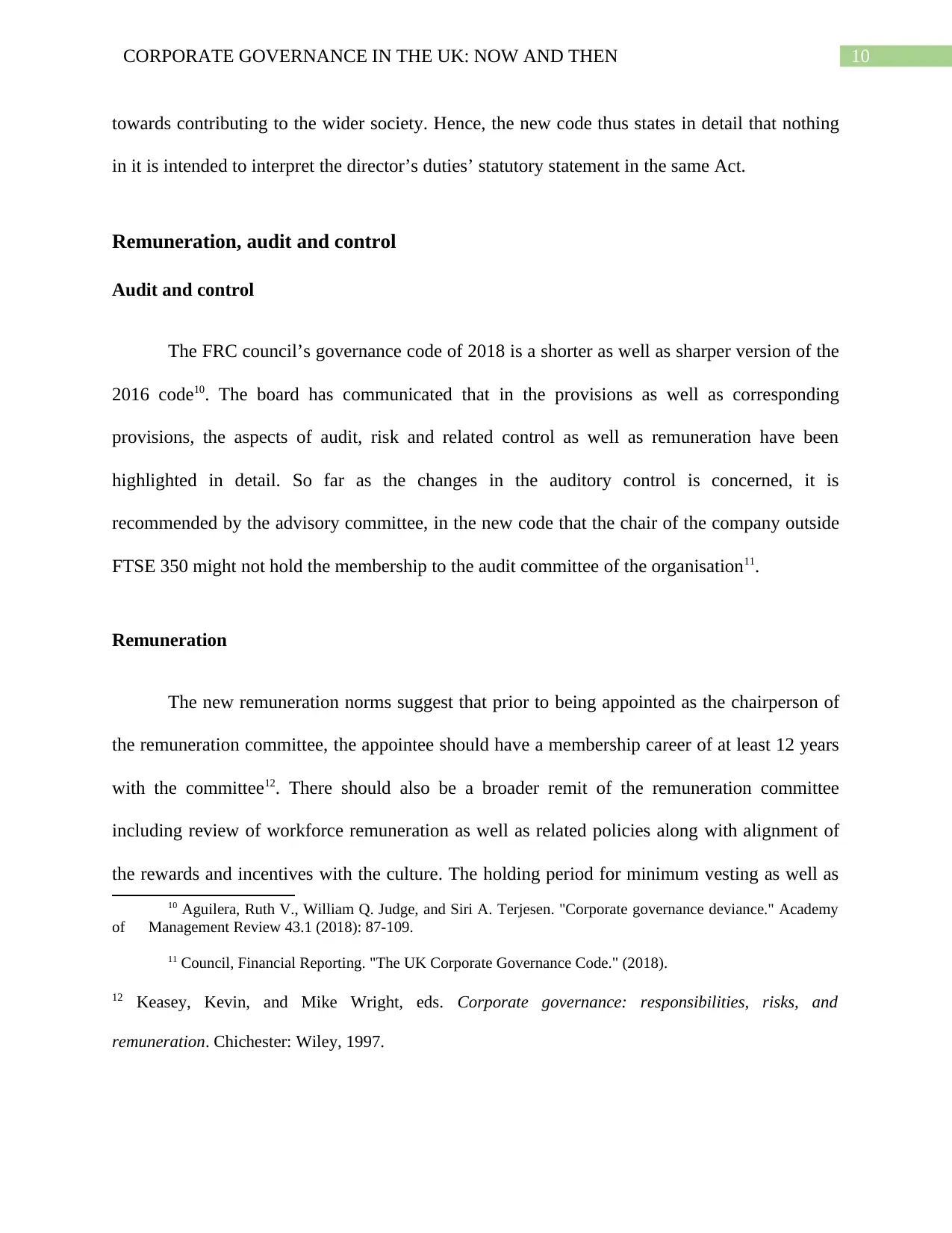
10CORPORATE GOVERNANCE IN THE UK: NOW AND THEN
towards contributing to the wider society. Hence, the new code thus states in detail that nothing
in it is intended to interpret the director’s duties’ statutory statement in the same Act.
Remuneration, audit and control
Audit and control
The FRC council’s governance code of 2018 is a shorter as well as sharper version of the
2016 code10. The board has communicated that in the provisions as well as corresponding
provisions, the aspects of audit, risk and related control as well as remuneration have been
highlighted in detail. So far as the changes in the auditory control is concerned, it is
recommended by the advisory committee, in the new code that the chair of the company outside
FTSE 350 might not hold the membership to the audit committee of the organisation11.
Remuneration
The new remuneration norms suggest that prior to being appointed as the chairperson of
the remuneration committee, the appointee should have a membership career of at least 12 years
with the committee12. There should also be a broader remit of the remuneration committee
including review of workforce remuneration as well as related policies along with alignment of
the rewards and incentives with the culture. The holding period for minimum vesting as well as
10 Aguilera, Ruth V., William Q. Judge, and Siri A. Terjesen. "Corporate governance deviance." Academy
of Management Review 43.1 (2018): 87-109.
11 Council, Financial Reporting. "The UK Corporate Governance Code." (2018).
12 Keasey, Kevin, and Mike Wright, eds. Corporate governance: responsibilities, risks, and
remuneration. Chichester: Wiley, 1997.
towards contributing to the wider society. Hence, the new code thus states in detail that nothing
in it is intended to interpret the director’s duties’ statutory statement in the same Act.
Remuneration, audit and control
Audit and control
The FRC council’s governance code of 2018 is a shorter as well as sharper version of the
2016 code10. The board has communicated that in the provisions as well as corresponding
provisions, the aspects of audit, risk and related control as well as remuneration have been
highlighted in detail. So far as the changes in the auditory control is concerned, it is
recommended by the advisory committee, in the new code that the chair of the company outside
FTSE 350 might not hold the membership to the audit committee of the organisation11.
Remuneration
The new remuneration norms suggest that prior to being appointed as the chairperson of
the remuneration committee, the appointee should have a membership career of at least 12 years
with the committee12. There should also be a broader remit of the remuneration committee
including review of workforce remuneration as well as related policies along with alignment of
the rewards and incentives with the culture. The holding period for minimum vesting as well as
10 Aguilera, Ruth V., William Q. Judge, and Siri A. Terjesen. "Corporate governance deviance." Academy
of Management Review 43.1 (2018): 87-109.
11 Council, Financial Reporting. "The UK Corporate Governance Code." (2018).
12 Keasey, Kevin, and Mike Wright, eds. Corporate governance: responsibilities, risks, and
remuneration. Chichester: Wiley, 1997.
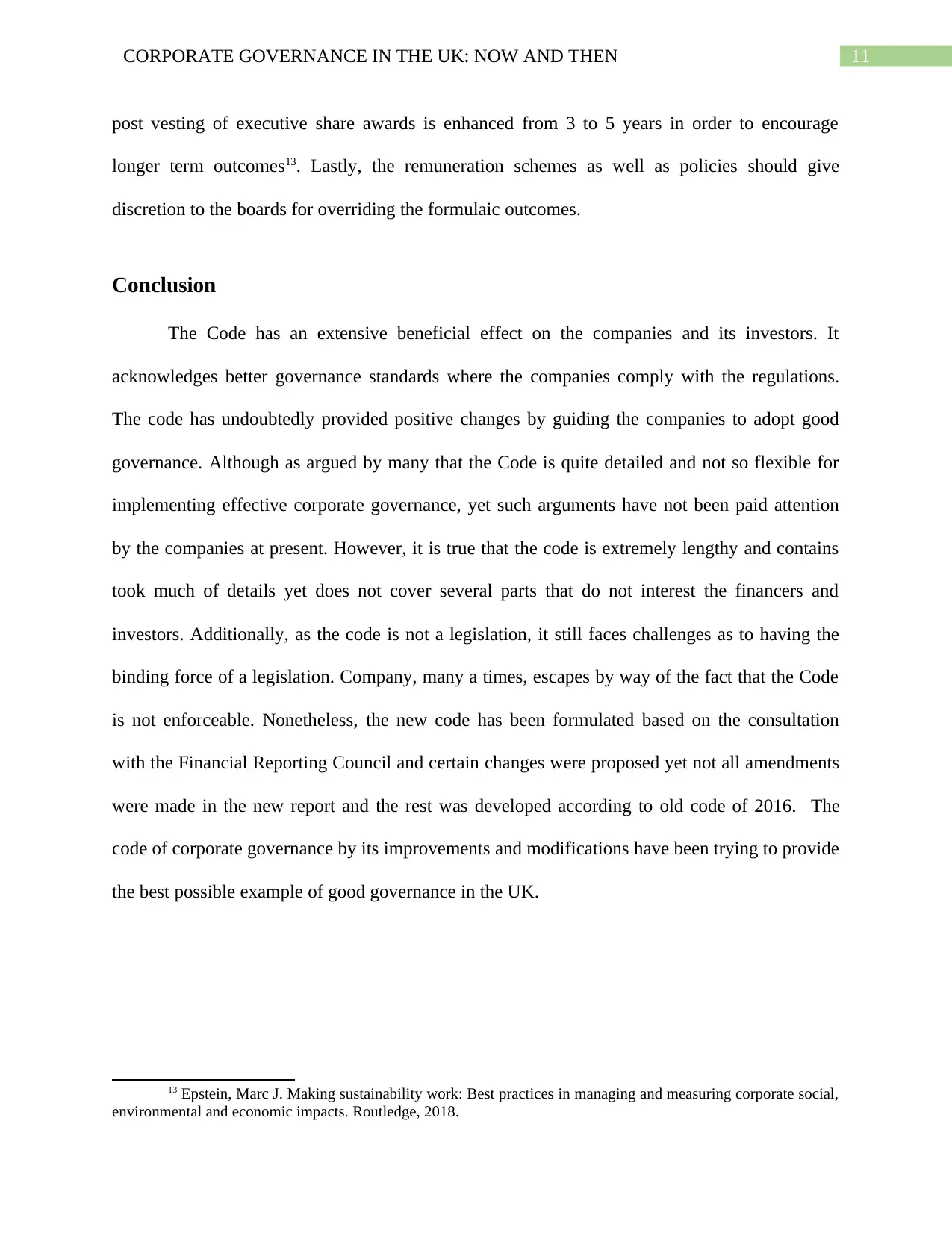
11CORPORATE GOVERNANCE IN THE UK: NOW AND THEN
post vesting of executive share awards is enhanced from 3 to 5 years in order to encourage
longer term outcomes13. Lastly, the remuneration schemes as well as policies should give
discretion to the boards for overriding the formulaic outcomes.
Conclusion
The Code has an extensive beneficial effect on the companies and its investors. It
acknowledges better governance standards where the companies comply with the regulations.
The code has undoubtedly provided positive changes by guiding the companies to adopt good
governance. Although as argued by many that the Code is quite detailed and not so flexible for
implementing effective corporate governance, yet such arguments have not been paid attention
by the companies at present. However, it is true that the code is extremely lengthy and contains
took much of details yet does not cover several parts that do not interest the financers and
investors. Additionally, as the code is not a legislation, it still faces challenges as to having the
binding force of a legislation. Company, many a times, escapes by way of the fact that the Code
is not enforceable. Nonetheless, the new code has been formulated based on the consultation
with the Financial Reporting Council and certain changes were proposed yet not all amendments
were made in the new report and the rest was developed according to old code of 2016. The
code of corporate governance by its improvements and modifications have been trying to provide
the best possible example of good governance in the UK.
13 Epstein, Marc J. Making sustainability work: Best practices in managing and measuring corporate social,
environmental and economic impacts. Routledge, 2018.
post vesting of executive share awards is enhanced from 3 to 5 years in order to encourage
longer term outcomes13. Lastly, the remuneration schemes as well as policies should give
discretion to the boards for overriding the formulaic outcomes.
Conclusion
The Code has an extensive beneficial effect on the companies and its investors. It
acknowledges better governance standards where the companies comply with the regulations.
The code has undoubtedly provided positive changes by guiding the companies to adopt good
governance. Although as argued by many that the Code is quite detailed and not so flexible for
implementing effective corporate governance, yet such arguments have not been paid attention
by the companies at present. However, it is true that the code is extremely lengthy and contains
took much of details yet does not cover several parts that do not interest the financers and
investors. Additionally, as the code is not a legislation, it still faces challenges as to having the
binding force of a legislation. Company, many a times, escapes by way of the fact that the Code
is not enforceable. Nonetheless, the new code has been formulated based on the consultation
with the Financial Reporting Council and certain changes were proposed yet not all amendments
were made in the new report and the rest was developed according to old code of 2016. The
code of corporate governance by its improvements and modifications have been trying to provide
the best possible example of good governance in the UK.
13 Epstein, Marc J. Making sustainability work: Best practices in managing and measuring corporate social,
environmental and economic impacts. Routledge, 2018.
⊘ This is a preview!⊘
Do you want full access?
Subscribe today to unlock all pages.

Trusted by 1+ million students worldwide
1 out of 14
Related Documents
Your All-in-One AI-Powered Toolkit for Academic Success.
+13062052269
info@desklib.com
Available 24*7 on WhatsApp / Email
![[object Object]](/_next/static/media/star-bottom.7253800d.svg)
Unlock your academic potential
Copyright © 2020–2026 A2Z Services. All Rights Reserved. Developed and managed by ZUCOL.





